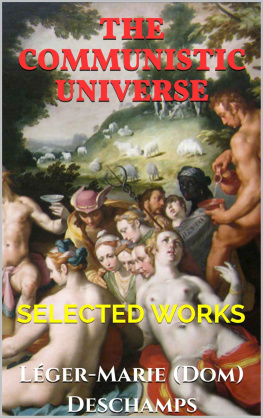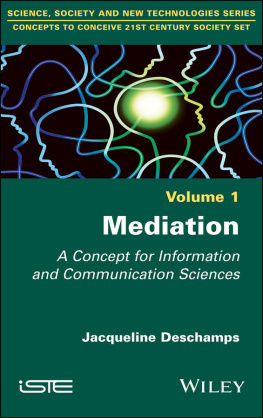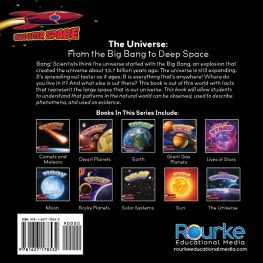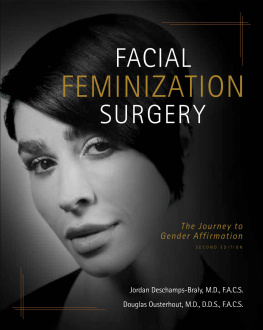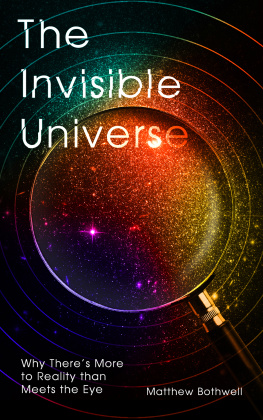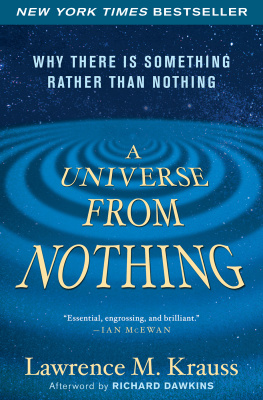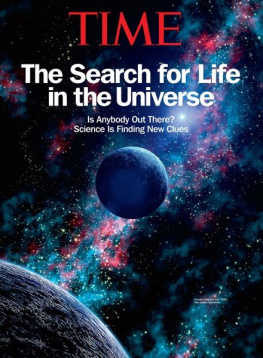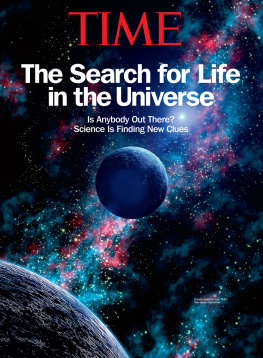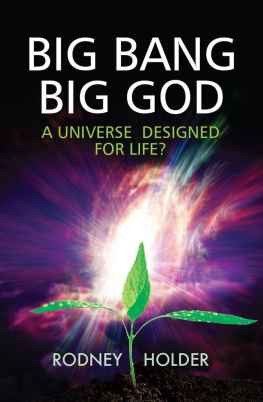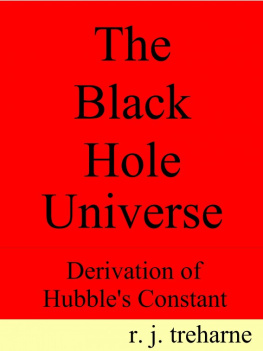Deschamps - The Communistic Universe
Here you can read online Deschamps - The Communistic Universe full text of the book (entire story) in english for free. Download pdf and epub, get meaning, cover and reviews about this ebook. year: 2017, genre: Science. Description of the work, (preface) as well as reviews are available. Best literature library LitArk.com created for fans of good reading and offers a wide selection of genres:
Romance novel
Science fiction
Adventure
Detective
Science
History
Home and family
Prose
Art
Politics
Computer
Non-fiction
Religion
Business
Children
Humor
Choose a favorite category and find really read worthwhile books. Enjoy immersion in the world of imagination, feel the emotions of the characters or learn something new for yourself, make an fascinating discovery.
- Book:The Communistic Universe
- Author:
- Genre:
- Year:2017
- Rating:3 / 5
- Favourites:Add to favourites
- Your mark:
- 60
- 1
- 2
- 3
- 4
- 5
The Communistic Universe: summary, description and annotation
We offer to read an annotation, description, summary or preface (depends on what the author of the book "The Communistic Universe" wrote himself). If you haven't found the necessary information about the book — write in the comments, we will try to find it.
The Communistic Universe — read online for free the complete book (whole text) full work
Below is the text of the book, divided by pages. System saving the place of the last page read, allows you to conveniently read the book "The Communistic Universe" online for free, without having to search again every time where you left off. Put a bookmark, and you can go to the page where you finished reading at any time.
Font size:
Interval:
Bookmark:
THE COMMUNISTIC UNIVERSE
SELECTED WORKS
LGER-MARIE (DOM) DESCHAMPS
TRANSLATED BY
KIRK WATSON
2017
Diderot once wrote a letter mentioning a monk, called Dom Deschamps, with the manner and tone of an old philosopher, who gave him one of the most violent and original books hed ever read, full of new ideas and bold claims. It described a future social state without kings, priests, magistrates, laws, the thine and mine, vice, or virtue. Upon reading it, he suddenly found himself in the world for which [he] was born .
Similar to the case of Julien Offray de La Mettrie, Lger Marie Deschamps is another (deliberately) forgotten extremist philosopher of the Age of Enlightenment, whose ideas were thought too bold, and which were therefore considered dangerous to the cause.
His writings were wide in scope: in metaphysics, he revived pantheism and promoted what he came to call Nothingism ( Rienisme) . His social and political thought represents a precursor to anarchism, socialism, and atheistic communism.
His metaphysical writings argue that what we call God is mostly a human invention, and that when we strip all anthropomorphism away from our God-concept, what were left with is The All, the totality, everything. Therefore, atheism is wrong in what he saw as its utter denial of the existence of real things, reality and the universe, as a concept. This essential idea of The All, of the totality, the great sea of which everything and everyone we know are simply temporary, but connected ripples, is an essential truth, and it leads us to a certain ethics. As Marcus Aurelius once put it, the mind of the universe is communisticit has subordinated and coordinated all things, given each and all their deserts, and brought the best into concord with one another! ( Meditations , 5:30).
In the same way, human society should be organized on common lines, with no mine and thine. Deschamps schematized human history into three basic stages: the savage, which is essentially the animal phase of humanity before any society had been organized, the social or policed state, i.e. everything from basic societies to great civilizations. And he meant for humanity to progress as soon as possible to a third state, the state of morals (French murs , which can also be translated customs), which harmonizes our natural side with the need for society.
His long speculations on this future state, along with his predecessor Morellys 1755 Code of Nature , represent a development from the previous travel-narrative form of utopian writing (e.g. Lucians True Story , Mores Utopia , etc.) towards the more scientific or straightforward descriptions of future society in the socialists of the generation after Deschamps (for example, Charles Fourier, Henri Saint-Simon, and Robert Owen).
His speculations are fascinating in themselves, and include a defense of free love, homosexuality, communal living, vegetarianism, euthanasia and suicide, even incest. He foresees the destruction of our fine arts and refined culture in general, along with most scientific pursuits, as mankind finds its final contentment in a mediocrity where people have no mental stress, speak the same simple language, where members of each gender would tend to look more alike, and where everyone would do easy chores and pursue natural pleasures, each keeping to the community where they were born, which together form the larger, pacified family of humanity.
The history of utopian thought is also the history of alternative ideas about how society could be organized. It lies behind many assumptions still treasured by many if not all contemporary secular thinkers: for example, when progressives say that another world is possible, that the nuclear family isnt the be-all and end-all, or that they dream of a world without war, each of these notions has already been elaborated for centuries in great detail. For better or worse, the dream of a secular society is rooted in this body of writing, which, unfortunately, remains largely unknown, both by its intellectual posterity and their enemies.
You dont want, O philosopher of the day who opposes me, anything but an army, the ensemble of which certainly leaves the idea of a form, or rather a whole which exists as a whole, as a being; and if you dont want this, its likely because the parts of which it composed dont seem to be linked to each other, nor do they form a whole, or a very compact unity, and arent very interconnected. But take your own body, which you think is your own, in the strict sense of the term, from which you make a you which is all yours: but since your individual, to use this unsuitable term, and the Earths globe, of which it is a very partial part
An army, you say, is only the soldiers of which it is composed: that is true; for a whole, and also the universal whole, as metaphysical as it is, can only ever be all its parts. But for being all its parts, a whole is no less a whole, as witness your person and the Earths globe: just as an army, for being the soldiers who comprise it, it is no less a whole: but, once again, lets leave the army, as a whole which is too fragmented in its parts, and lets look at other, more plain wholes.
This is what you should have done, instead of hanging, as youve done, in hopes of besting me, on loose wholes like armies, or generalities of sparse bodies, like those of men and trees: these generalities are only parts of the generality with the Earths globe, of which your person is a part, and which, with all other possible globes and their vortices, produce a generality which is no longer particular or physical, but universal, metaphysical.
Youll object that these globes are sparse bodies, and truly separate from each other; but this is only what your misleading sight tells you, and which, by its feature of being particular, by its limited nature, must mislead you. The globes which seem separate to you are in fact linked to each other, and with their interlinked vortices produce the universal generality, the metaphysical being called the universe. The continuity of nature is only disrupted to the bodys eyes. Nothing in it is separate or independent: nothing in it is individual, except to one or another of our senses; one or another are always misled by all of them when they speak together, when they only have the voice shared by all beings.
According to you, the tree in general doesnt exist; this is no different than saying that the generality of trees doesnt exist. For what is the tree in general, except the generality of trees? But if the generality of trees exists, why wouldnt the generality of beings, or, which amounts to the same thing, being in general, exist? I know that no tree is produced from the generality of trees; that the particular cannot be produced by its generality. So I dont claim that a particular being is produced by the universal generality, which would be repugnant, but the general or universal being which is this generality itself.
This being which, according to you who absolutely refuse to accept existence in general, only exists in the mind; but what is the mind, this being who so vaguely toss into my head? What is the mind or the soul, as conceiving the universal being, except the Understanding , this word which I beg you to take in the sense I will give it? And what is the Understanding, this faculty which is so distinct from acquired ideas, from the mind in the philosophical sense, from what we call our thoughts ; but this universal being itself, this metaphysical basis which exists the same in everything and everywhere , with the nuances of physics, and which we have made into a god principle and an immortal soul in each of us; instead of seeing the thing itself as the principle, and which the ancient philosophers called the soul of the world , without knowing it? Forget about Scotus, who certainly never knew about this universal, and who, like everyone else, was unaware it that had a nature distinct from its parts, in the distributive sense; that it was the first principle, the highest good .
Next pageFont size:
Interval:
Bookmark:
Similar books «The Communistic Universe»
Look at similar books to The Communistic Universe. We have selected literature similar in name and meaning in the hope of providing readers with more options to find new, interesting, not yet read works.
Discussion, reviews of the book The Communistic Universe and just readers' own opinions. Leave your comments, write what you think about the work, its meaning or the main characters. Specify what exactly you liked and what you didn't like, and why you think so.

